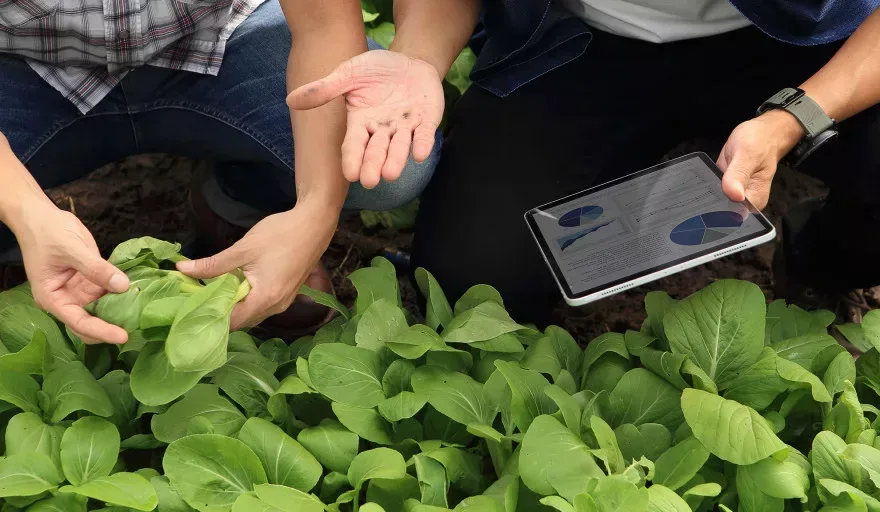In partnership with Microsoft, the Alliance for a Green Revolution in Africa (AGRA) has launched its new digital tool, the ‘AgriBot’. A catalyst for inclusive agricultural transformation, we find out more in a quickfire Q&A with Senior Programme Officer for Digital Systems and Solutions at AGRA, Nixon Gecheo.
Q&A WITH NIXON GECHEO, AGRA
What originally drew you to working in the agricultural sector, particularly within Africa?
Nixon Gecheo (NG): I am an ICT specialist by training. From my previous experience in the public sector, I witnessed first-hand the impact of technology across sectors. It is in the agriculture sector where technology has the most transformative impact. This drew me into the sector to help drive digital systems and solutions for Africa’s agriculture. I am passionate about developing and deploying evidence-based solutions that can help tackle challenges in Africa’s food systems.
What role does technology have to play in advancing Africa’s agricultural future?
NG: Digital agriculture is transforming the sector in Africa through the application of innovative tools and new business models. Many players in the value chains, including farmers, now have access to real-time data and computational power, enabling more effective selection and timing of product-to-market decisions, provision of credit, access to extension support and advisory on production and micro insurance, conveniently on their phones. Technology can help food systems become more agile and resilient, to safeguard the livelihoods that depend on it. Technology also facilitates the intensification of production sustainably without harming the environment. Digital technology holds significant potential for creating formal jobs that are accessible to the youth in Africa. Through entry points such as precision farming, mechanisation, service provision and e-commerce, technology can address the major challenge of youth employment and agripreneurial opportunity. Given that 70 percent of sub-Saharan African’s population is under 30 years of age, nowhere is the job creation challenge more acute.

“Digital innovation is critical in advancing food security and poverty eradication in Africa”
Nixon Gecheo, Senior Programme Officer, Digital Systems and Solutions, AGRA
Could you tell us about AgriBot – what led to the platform’s inception and how will this technology impact smallholder farmers?
NG: The AgriBot was co-created by AGRA and Microsoft and is being rolled out by AGRA in Kiambu and Embu counties in Kenya as proof of concept. AgriBot is a digital solution that provides localised extension and advisory services at scale to smallholder farmers through inclusive omnichannel application experiences like Short Message Service (SMS) and WhatsApp for prioritised value chains. After registration, farmers input their personal details and location. They then begin receiving up-to-date information on weather forecasts and other information such as seed varieties to be planted, recommended farm inputs, and good agronomic practices (this includes land preparation, planting, and harvesting). Farmers also get early warning reports on pests such as fall armyworms and locusts. Through the AgriBot, smallholders can be trained by their elite peers, known as village-based advisors, who are linked to the county governments.
Since its launch, how has AgriBot been received by the farming community?
NG: The AgriBot is filling a huge gap in extension services in Kenya, which currently stands at 1:5,000 farmers, compared to the recommended 1:400. In one year since it was officially launched, AGRA’s AgriBot service has recorded 48,604 farmer registrations, 838 Village-Based Advisor (VBA) registrations and 97,597 interactions. The Bot has impacted the lives of VBAs and farmers by providing quick and reliable information to farmers and improving VBAs’ efficiency to deliver extension services through features such as farmer messaging and localised content (Agro dealer’s list and seed varieties). Some of the most accessed features of the Bot are good agronomic practices, improved maize seed varieties, weather forecasting and free messaging where VBAs get to message their farmers through the Bot at no cost to them. The Bot has capabilities to expand beyond its current uses, which creates an opportunity for other partners and platforms to plug and play and promote different products and services. The services can be modified based on demand. The Bot is linked to PowerBI, which can display dashboards for content accessed and usage, and different partners can be enabled access and visibility as per need.
Looking ahead, are there any further plans for new technological innovations from AGRA?
NG: We are also partnering with CropIn in digitising 10,626 entrepreneurial VBAs through the Smart Farm Plus solution to reach two million farmers in Ghana, Nigeria, Burkina Faso, Mali, Tanzania and Mozambique. Knowledge dissemination and advisory services to farmers via VBAs will be provided through the digital platform by the remotely placed agronomists. Advisory services will also be provided on sustainable farming practices, pest and disease outbreak, weather forecasts, and more. The partnership seeks to solve the challenges that the continent faces, including a severely weakened public sector extension system, inadequately trained personnel at a local level and lack of access to agriculture technologies. It is such challenges that informed AGRA’s decision to focus on the development of private sector extension as a critical enabler towards inclusive agricultural transformation.
We have also worked on the digitisation of rural financial services by leveraging financial and agricultural technologies to improve all aspects of loan processing, decision and delivery and to provide value-added services for rural communities. AGRA has also supported digitally enabled farm mechanisation to address the constraints of equipment dealers, financial service providers, agricultural value chain actors, maintenance providers, equipment owners and operators, booking agents, technology providers and smallholder farmers. A digitally enabled mechanisation on the app connects farmers with tractor owners. Tractor agents assist with the bookings, while tractor owners need to buy the company’s GPS device to attach to their tractors to track movements and accept requests, similar to how the ride-hailing apps work. This creates work opportunities for youth as equipment operators, booking agents, and maintenance providers as proven through AGRA’s partnerships with TATA solutions, ETC Agro, John Deere and digital solutions such as Tro-tro Tractors, hello tractor and Rent-A-Tractor. Moving forward we feel that digital innovation is critical in advancing food security and poverty eradication in Africa. AGRA is integrating digital excellence in its new strategy 2022-2027 to accelerate the improvement of farmers’ livelihoods. Through the digital strategy, AGRA aims to promote digitisation as an enabler to connect agriculture ecosystems, as well as sustainable integration of governments, markets and villages operating in the relevant strategic value chain.






























